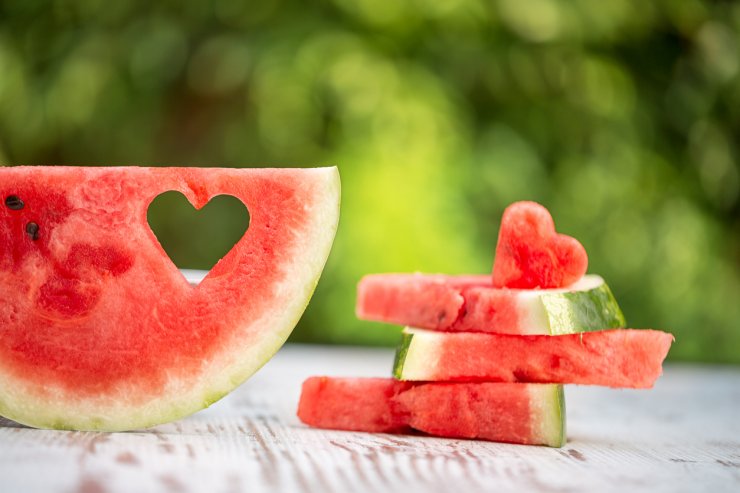
Watermelon in the shape of a heart

Watermelon in the shape of a heart
Watermelon contains no bad fat or cholesterol and is said, in some cases, to reduce inflammation in the body. Its plant compounds are linked to lower blood pressure, improved metabolic health, and decreased muscle soreness after exercise. And, being packed with water, it’s excellent for maintaining good hydration.
Heart Health
Watermelon is American Heart Association Heart-Check Certified. It is cholesterol-free, fat-free, and sodium-free, and has 80 calories per serving.
Watermelon also has several heart-healthy components, including lycopene, citrulline, and other vitamins and minerals. For example, citrulline, an amino acid, may increase nitric-oxide levels in the body. Nitric oxide helps your blood vessels expand, which lowers blood pressure.
Cancer Prevention
Some compounds in watermelon, including cucurbitacin E and lycopene, have been studied for their potential to prevent cancer, though study results are mixed.
Sexual Health
Based on preliminary research and studies, the citrulline in watermelon has shown promising signs of being an effective natural treatment for erectile dysfunction in men.
Inflammation
Rich in the anti-inflammatory antioxidants lycopene and vitamin C, watermelon may help lower inflammation and oxidative damage. As an antioxidant, lycopene may also benefit brain health. For example, it may help delay the onset and progression of Alzheimer’s disease.
Lycopene is also found in several parts of the eye where it helps protect against oxidative damage and inflammation.
Skin Health
Two vitamins in watermelon—A and C—are important for skin and hair health. Vitamin C helps your body make collagen, a protein that keeps your skin supple and your hair strong. Vitamin A is also important for healthy skin since it helps create and repair skin cells. Without enough vitamin A, your skin can appear dry and flaky.
Both lycopene and beta-carotene may also help protect your skin from sunburn.
Watermelon Juice Masks for Healthy skin
In addition to being good for your skin from the inside out, watermelon can also be used in topical masks. Here are several variations to try if you have damaged, dull, or dry skin:
Watermelon Juice and Honey Face Mask for Damaged Skin
A watermelon juice and honey face mask is perfect for those looking for an instant solution for damaged skin—a danger you face if you’ve spent a lot of time in the sun working on your garden!
- How to apply: Mix equal amounts of honey and cold watermelon juice. Wash your skin with cold water and pat dry. Apply the mask to your face and neck, and let it stay for 30 minutes. Wash it off with cold water.
Watermelon Juice and Yogurt Face Mask for Glowing Skin
The combination of watermelon juice and yogurt can give you supple, radiant skin. Regular use of this face mask can make your skin look younger and healthier.
- How to apply: Take a small bowl and add a half cup of watermelon juice to it. Add one tablespoon of yogurt, and mix both the ingredients well. Apply the mask to your face and neck, and let it stay for 20 minutes. Wash it off with cold water.
Watermelon and Lemon Juice for Dry Skin
If you have dry skin, then bring this watermelon and lemon juice face mask to your rescue. Lemon will gently exfoliate your dry, dead skin cells, whereas honey and watermelon juice will moisturize and hydrate rough skin.
- How to apply: Put two tablespoons of watermelon juice in a small bowl; add one tablespoon of lemon juice and one teaspoon of honey. Mix all the ingredients well. Apply the mask to your face and neck. Let it stay for 10 to 15 minutes, then wash it off with water.
Did you know that watermelon is such a super food? Please tell us about healthy ways you use watermelon.



